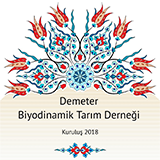Biyodinamik hareketin 6-9 Şubat 2019 tarihleri arasında İsviçre-Dornach Goetheanum’da düzenlelediği, ana teması ‘TARIM EKONOMİSİ’ olan- Çiftliğin özgün yapısı ve küresel ekonomi arasındaki ilişkilerin biyodinamik tarım boyutunda irdelendiği TARIM KONFERANSI hakkında olarak ekim ayı sonu itibariyle aşağıdaki web sitesinden içerik ve kayıt konusunda bilgi edinebilirsiniz.
www.sektion-landwirtschaft.org
Bir çiftlik, başlı başına mikro bir ekonomidir! Biyodinamik bir çiftlik, özellikle kendi gereksinimlerini karşılamak ve belirli bir derecede kendi kendine yeterlilik elde etmeye odaklanmıştır. Biyodinamik çiftlik mutlaka tarımsal ve ekonomik anlamda kendi kendine yeterli olmaya yönelik olmalıdır denildiğinde ne anlatılmak isteniyor? Biyodinamik bir çiftliğin sürdürülebilir toprak verimliliği nereden geliyor?
Biyodinamik tarım demek doğrudan doğa ile uyumlu çalışmak demek. Finansal yeterli olabilmek adına pazara yakın durabilmek için bilinçli adımlar atılmalı. İşte bunun içinde pek çok yenilikçi adımlar atılmak zorunda.(mesela : Topluluk destekli tarım gibi)Bu konferans bilgi alışverişi ve girişimcilerin tarım ekonomisi ile ilgili yeni fikirler paylaşabilecekleri bir platform.Bu konuda değişik ülkelerdeki uygulamalardan örnekler verilecektir. Bir çiftliğin yapısını en iyi şekilde nasıl anlayabiliriz ve bu yönde en ekonomik şekilde geliştirmemiz mümkün olabilir? Bu yönde bölgesel birlikler ne tür çalışmalar yapabilir? Tarımın global ekonomi üzerinde özel yönlendirici bir etkisi var mıdır? Tüm bu sorularla ilintili ve uygulaması yapılmış örnek çalışmalarla ilişkisel ekonomik coğrafyanın yeniden kurgulanarak temel esaslarına varmayı hedefliyoruz
Bu genel kavramın içerisinde mesela tarladan sofraya , kuzey-güney ticari bağlantıları,toprağın ortak değeri..vb.-daha spesifik temalı çalışmalara da yer verilecek.
Düzenlenecek olan 20 farklı workshop çalışmasında bunları deneyimleyebilir ve artistik kurslara, Goetheanium’u tanıtan turlara da katılabilirsiniz.Konferans 5 ayrı dilde düzenlenecektir.(Almanca,İngilizce,Fransızca,İspanyolca ve İtalyanca) İlgilenen herkese açıktır.
Konuşmacılar : Maaianna Knuth (Zimbabve), Gerald Häfner (Almanya), Änder Schanck (Luksemburg), Choitresh Kumar Ganguly und Manisha Kairaly (Hindistan), Helmy Abouleish und Mona Lenzen Abouleish (Mısır), Christoph Simpfendörfer (Almanya), Aline Haldemann und Christian Butscher (İsviçre), Jennifer Chang (Güney Kore), Boris Voelkel (Almanya), Jacqueline Barin (Kanada) Esteban Acosta Pereira (Meksika) , Hermann Pohlmann (Almanya), Claude Gruffat (Fransa), Ueli Hurter (İsviçre), Volkert Engelsman (Hollanda), Patrick Holden (İngiltere).
Agriculture Conference 2019
The Economy of Agriculture – between farm individuality and global economy Annual International Conference of the biodynamic movement 6th to 9th February 2019 at the Goetheanum, Dornach, Switzerland The conference is based on the current annual theme of the Section for Agriculture:
The Economy of Agriculture – between farm individuality and global economy
Biodynamic agriculture as a wellspring for relationships and value creation
What is the task of agriculture within local, regional and global economic life? What is its task in relation to nature and the resources it uses? What responsibility does it have towards the people it is feeding? Is there a specific biodynamic approach to agricultural economy? “The Economy of Agriculture” is a theme that should challenge us to look more closely at the issues, understand them better and work more collaboratively.
The farm is its own small economy. The biodynamic farm is particularly focused on meeting its own requirements and attaining a certain degree of self-sufficiency. Do we understand clearly enough why the biodynamic farm must necessarily aim to become agriculturally and economically self-sufficient? Where does the sustainable soil productivity of the biodynamic farm come from?
The farm is also embedded in a regional economy. Not every farm is able to store its own grain, mill its own flour and make bread with it nor can every farm have its own dairy or farm shop. By far the greater portion of all Demeter and organic products reaches the consumer via a production chain that involves the division of labour. Over the last decades numerous ways have been found to enhance cooperation between farms, food processors, wholesalers, retailers and the various voluntary organisations that share similar values. The beginnings of associative working has come about in many different places. Associative economics is a sister impulse of biodynamics. Together they have formed a strong socially formative impulse over the last 30 years which has made a significant impression on the developing organic ‘Biofach’ market.
Dramatic developments have occurred in this field over the last three years. Organic and increasingly also Demeter products have found access to commercial trading channels. One speaks of the ‘conventionalisation’ of the organic market. How do we respond to this development? Can we take a further step towards an associative economy through the regional trading of organic and Demeter products? Where could we begin? What prototypes are there for creating the right price, building a conscious link between producers and consumers, financing enterprise and addressing the question of property ownership?
Various forms of farm processing and direct marketing exist. From the very beginning a signature of the biodynamic movement has been its conscious and economically necessary engagement with consumers. New approaches including community supported agriculture (CSA) are continually being developed. In this field many exciting and stimulating stories from all over the world, can be told.
The biodynamic approach is universally applicable, can be taken up in all regions, climatic zones and cultural contexts and yet lead to the individualisation of the farm. We are called upon not only to think and act regionally, but also globally. The basis of production is not only one’s own farm but the whole earth as a living being. It is not only our own hunger we must satisfy but the hunger of everyone on this earth. What is our contribution to the problem of world hunger? How can we help to reform the world’s food system? What needs to be done to ensure that organics provides nourishment to the world rather than simply filling stomachs?
It is becoming increasingly apparent that agriculture is not only about the primary production of food. It also affects our drinking water the climate. Agriculture has an ecological reach that extends way beyond the specific places where it is practised. How far have we come in implementing the concept of ‘true cost accounting’? It is something that applies not only on an ecological level but on an economic one too – the living organic and biodynamic economy of agriculture serves to counterbalance the resource consuming activity of industry. To measure agriculture only in terms of its contribution to GDP, is to misunderstand its overall economic significance. Is it possible to acknowledge and express the contribution that agriculture makes to the whole economic system?

